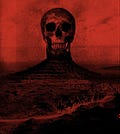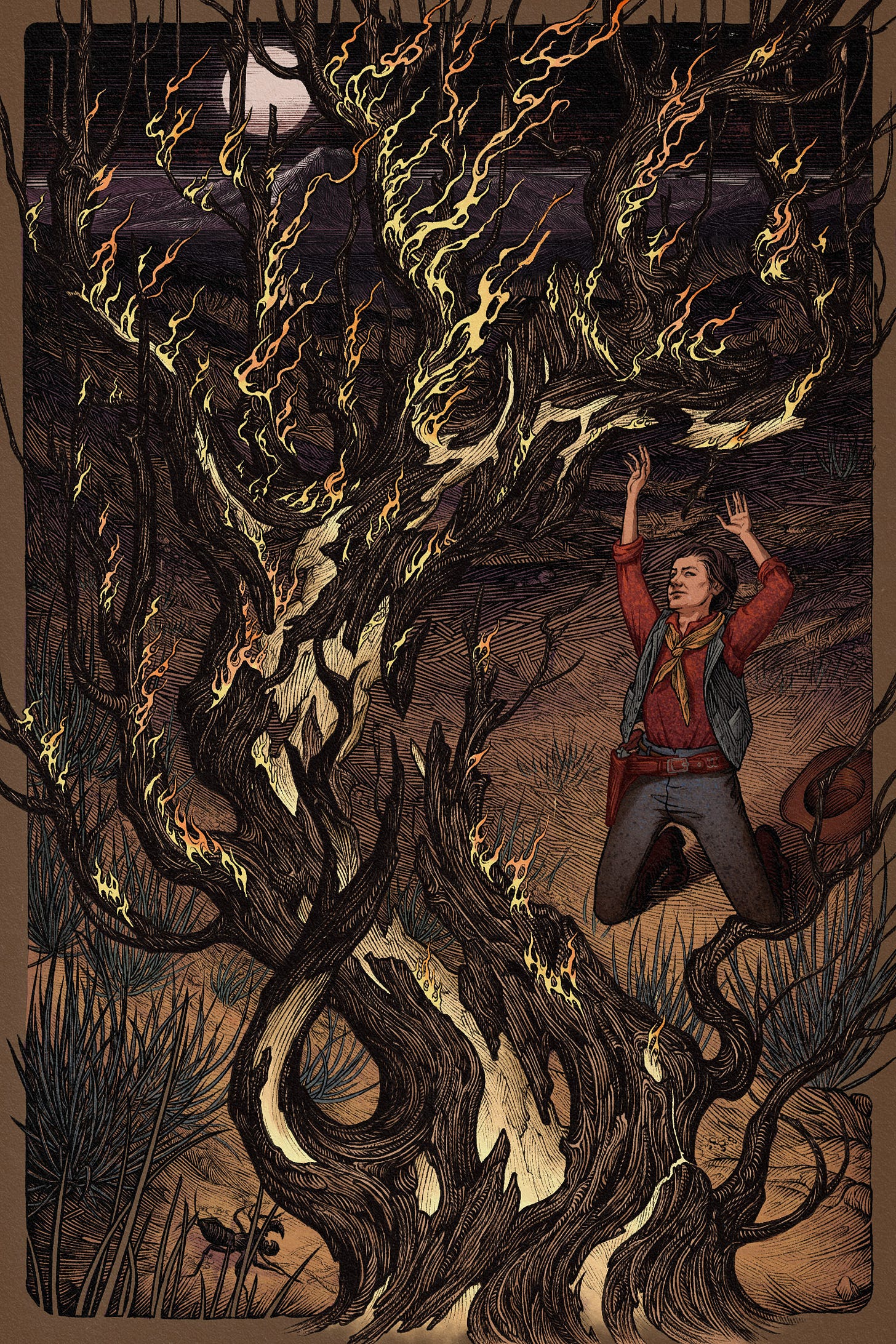1. We Are Not Speaking In Mysteries
In the final chapter of Blood Meridian, the Kid is a forty-five-year-old drifter who encounters Judge Holden for a final time in a saloon in Fort Griffin, Texas. The two haven’t seen each other in twenty-seven years and though the Kid has transformed into a world-weary adult, Judge Holden “seems little changed or none in all these years” (338).
The Judge hasn’t presented himself to the novel’s protagonist one last time to reveal the secrets of his beauty routine. Rather, he’s interested in interpreting the meaning of the Kid’s time with Glanton’s gang of scalp-hunters. He lectures our protagonist, adopting the tone of a professor who cut his teeth on the Socratic method:
“One could well argue that there are not categories of no ceremony but only ceremonies of greater or lesser degree and deferring to this argument we will say that this is a ceremony of a certain magnitude perhaps more commonly called a ritual. A ritual includes the letting of blood. Rituals which fail in this requirement are but mock rituals. Here every man knows the false at once. Never doubt it. That feeling in the breast that evokes a child’s memory of loneliness such as when the others have gone and only the game is left with its solitary participant. A solitary game, without opponent. Where only the rules are at hazard. Don’t look away. We are not speaking in mysteries. You of all men are no stranger to that feeling, the emptiness and the despair. It is that which we take arms against, is it not? Is not blood the tempering agent in the mortar which bonds? What do you think death is, man? Of whom do we speak when we speak of a man who was and is not? Are these blind riddles or are they not some part of every man’s jurisdiction? What is death if not an agency? And whom does he intend toward?” (342-43, emphasis mine)
The Kid’s response to all this?
“I don’t like craziness.”
But of all the Judge’s lectures, this is the least crazy—and, perhaps, the most important to the dark, burning heart of McCarthy’s masterpiece.
Of particular interest in the above-quoted passage is Holden’s assertion that men take arms against despair and loneliness. In other words, we murder so we don’t get sad.
To say the least, this is a disturbing view of the Glanton Gang’s reign of terror across northern Mexico and the southwestern United States. It’s also the most “human” thing the Judge has said in the novel: it references an emotional state that vicious men are trying to escape by committing violent acts.
This is murder-as-emotional-evasion. Violence-as-addiction. Savagery-as-antidepressant.
As always, Holden’s lessons disturb and disrupt. The Kid may dismiss the Judge’s lecture as craziness, but here the Judge is speaking directly to ideas that are critical to understanding what McCarthy is up to in Blood Meridian.
When Holden asks the Kid, “What is death if not an agency?” a bright buzzer should be sounding in the Reader’s brain.
Here, agency is used in the sense of “power or action.” The Judge proposes that death is not an erasure, but an act of empowerment.
If Holden’s view is the view of the novel, this casts all the carnage we’ve witnessed over the past 350 pages in a much different light.
When critics talk about Blood Meridian being shot through with Gnostic ideas, this is one of the passages they’re referring to.
But what, exactly, is Gnosticism?
2. If The Light That Is In Thee Be Darkness
Even today, Gnosticism has its adherents, though each will likely give you a different definition of this loose collection of heretical religious beliefs (ancient Greek: γνωστικός, romanized: gnōstikós, “having knowledge”).
In her essay, “‘Striking the Fire Out of the Rock’:
Gnostic Theology in Cormac McCarthy’s Blood Meridian,” Australian scholar Petra Mundik, breaks down the core tenets of Gnosticism as they relate to McCarthy’s novel:
“According to Gnostic theology, the entire manifest cosmos was created by a hostile (or at best, ignorant) force of darkness and is thus a hideous aberration. This force of darkness usually takes the form of a creator-God known as the demiurge (William Blake’s ‘Nobodaddy’), identified as Yahweh of the Old Testament. The demiurge rules over all that he has created, sometimes with the assistance of evil angels known as archons, while the real or alien God remains wholly transcendent and removed from the created world. Some Gnostic texts claim that the demiurge is merely ignorant and genuinely believes that he is the only God, while other texts claim that he purposefully conceals the existence of the alien God in order to maintain his sole dominion over the manifest cosmos. Humanity has a divided nature, composed of a body and soul, which were created by and belong to the demiurge, but also a spirit, or pneuma, which belongs to the alien God. The pneuma is actually a fragmented spark of the divine which has fallen into, or in some cases, been maliciously trapped in the evil manifest cosmos. Thus, people are composed of both mundane and extra-mundane principles and carry within them the potential for immanence as soul and flesh, or transcendence as pure spirit.” (73)




